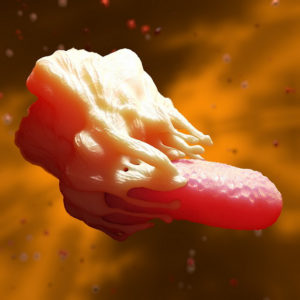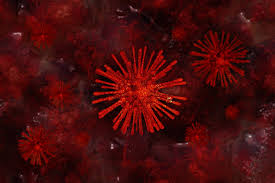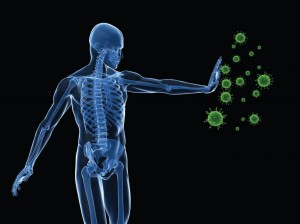Highlights
- •T cells modulate trained immunity induction in monocytes via CD40-TRAF6 signaling
- •Blocking CD40-TRAF6 signaling inhibits trained immunity in monocytes in vitro
- •SNPs in the proximity of CD40 associate with trained immunity responses in vivo
- •Myeloid-specific CD40-TRAF6 inhibition prolongs allograft survival in vivo
Summary
Trained immunity is characterized by histone modifications and metabolic changes in innate immune cells following exposure to inflammatory signals, leading to heightened responsiveness to secondary stimuli. Although our understanding of the molecular regulation of trained immunity has increased, the role of adaptive immune cells herein remains largely unknown. Here, we show that T cells modulate trained immunity via cluster of differentiation 40-tissue necrosis factor receptor-associated factor 6 (CD40-TRAF6) signaling. CD40-TRAF6 inhibition modulates functional, transcriptomic, and metabolic reprogramming and modifies histone 3 lysine 4 trimethylation associated with trained immunity. Besides in vitro studies, we reveal that single-nucleotide polymorphisms in the proximity of CD40 are linked to trained immunity responses in vivo and that combining CD40-TRAF6 inhibition with cytotoxic T lymphocyte antigen 4-immunoglobulin (CTLA4-Ig)-mediated co-stimulatory blockade induces long-term graft acceptance in a murine heart transplantation model. Combined, our results reveal that trained immunity is modulated by CD40-TRAF6 signaling between myeloid and adaptive immune cells and that this can be leveraged for therapeutic purposes.
Introduction
In the previous decade, the paradigm that immunological memory is a distinctive feature of the adaptive immune system has been refuted by studies revealing that innate immune cells can also develop immunological memory. This memory can occur in the stem cell niche of the bone marrow or in the periphery in cells that are circulating or residing in tissues. Innate immune memory, also termed trained immunity, involves metabolic and epigenetic changes induced by an initial stimulus. This stimulus can be certain microorganisms, of which Candida albicans and Bacillus Calmette-Guérin (BCG) are well-studied examples, or sterile inflammatory triggers, such as damage-associated molecular patterns (DAMPs) and inflammatory cytokines (e.g., interleukin-1β [IL-1β]). The resulting epigenetic changes facilitate the transcription of inflammatory genes that cause innate immune cells to develop a stronger inflammatory response upon restimulation.
Metabolic rewiring is essential for mediating these epigenetic alterations by supplying metabolites serving as substrates for epigenetic enzymes or as co-activators or co-repressors for enzymes involved in writing or erasing epigenetic marks. By increasing inflammatory responsiveness, trained immunity provides a functional adaptation to protect the host from infection. However, trained immunity can also cause maladaptive immune responses in autoinflammatory disorders, atherosclerosis, cancer, and organ transplantation.
Prior research has identified triggers capable of inducing trained immunity and elucidated intracellular signaling pathways that regulate the metabolic and epigenetic changes that underlie this phenomenon. However, little is known about how adaptive immune cells modulate trained immunity. As T cells play an essential role in modifying innate immune cell activation and differentiation, it is conceivable that T cells have a modulatory effect on trained immunity.16 Unraveling the role of the adaptive immune system in trained immunity is, therefore, imperative to better understand host defense mechanisms and gain new insights into the pathology of immune-mediated diseases.
In this study, we investigated the role of T cells in modifying trained immunity. By examining the interaction between T cells and monocytes in vitro, we found that T cells contribute to the training of monocytes. We show that this supportive role of T cells in trained immunity is mediated by cellular interactions between monocytes and T cells and involves cluster of differentiation 40 (CD40) activation on the monocyte. By combining transcriptomic, metabolomic, and epigenetic studies, we reveal that inhibiting CD40-tissue necrosis factor receptor-associated factor 6 (TRAF6) signaling attenuates trained immunity in monocytes. This important role for CD40-TRAF6 signaling was corroborated by the identification of single-nucleotide polymorphisms (SNPs) in the proximity of the CD40 gene that were associated with altered trained immunity responses in humans. Next, we investigated the efficacy of modifying trained immunity by in vivo CD40-TRAF6 blockade. To this end, we used CD40-TRAF6 inhibitor-loaded nanobiologics (CD40-TRAF6i-NBs) with a high propensity for myeloid cell uptake. In a murine heart transplantation model, we found that short-term CD40-TRAF6i-NB therapy, combined with co-stimulatory blockade by cytotoxic T lymphocyte antigen 4-immunoglobulin (CTLA4-Ig), prolongs allograft survival. Our findings provide insight into how T cells shape trained immunity and identify CD40-TRAF6 signaling as an essential modulator.
Results
T cells potentiate trained immunity in monocytes
We studied the role of T cells in trained immunity by comparing its induction in adherent peripheral blood mononuclear cells (PBMCs), which comprise around 50%–75% of T cells, to that in monocytes purified from healthy donor PBMCs by magnetic-assisted cell sorting (MACS). We used a previously described protocol to induce trained immunity in vitro using heat-killed Candida albicans (HKCA) or BCG vaccine, which are well-studied inducers of trained immunity.
Adherent PBMCs and purified monocytes were stimulated for 24 h with HKCA, BCG vaccine, or RPMI culture medium (control), after which cells were rested for 5 days (Figure 1A). Monocyte differentiation in our assay was not different between HKCA-stimulated versus unstimulated (RPMI) PBMCs (Figure S1). After the resting period, cells were restimulated for 24 h with the Toll-like receptor (TLR)-4 agonist lipopolysaccharide (LPS) or the TLR-1/2 agonist Pam3Cys-Ser-(Lys)4 (Pam3CSK4), after which tumor necrosis factor (TNF) and IL-6 production was measured in the supernatant. Trained immunity was assessed by the difference in TNF and IL-6 production between untrained and trained cells….







